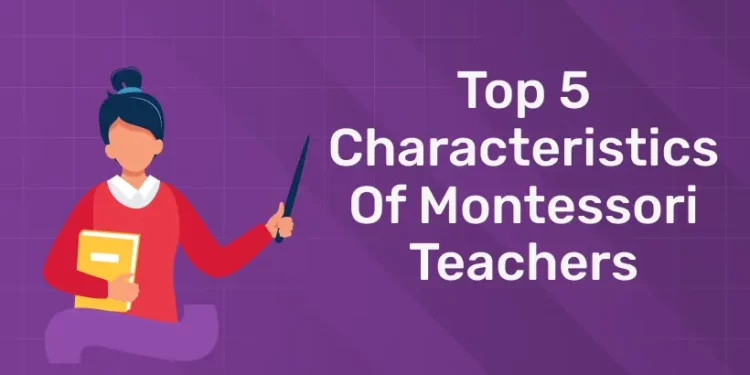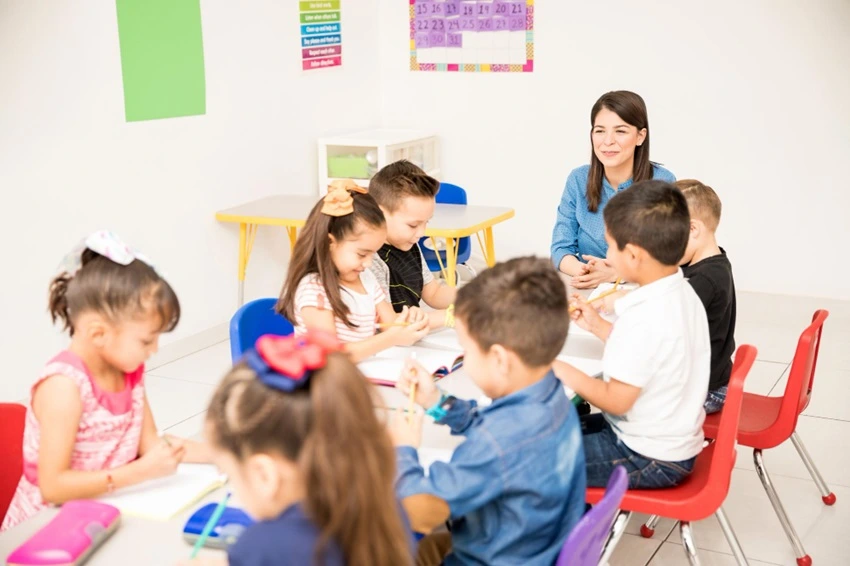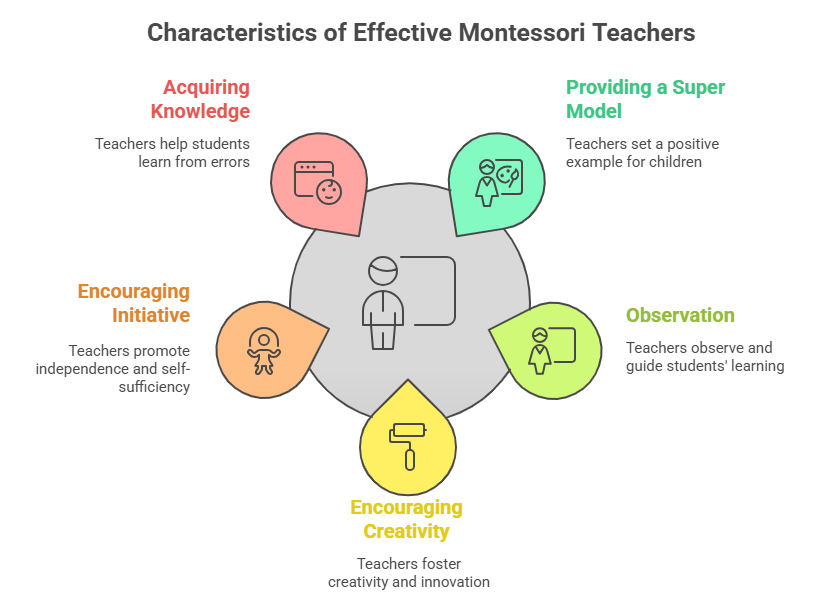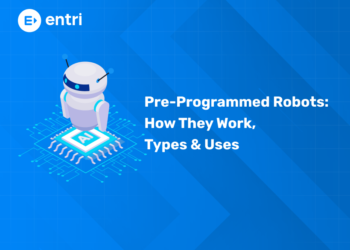Table of Contents
A Montessori teacher is so much more than just teaching lessons and activities. Unlike traditional teaching models, Montessori is about nurturing a child’s natural curiosity and independence, creativity, and love of learning. The teacher’s role in this environment is to be a facilitator, mentor, and observer, not a traditional authority figure. Montessori teachers need to have certain qualities and characteristics that make them effective in creating a child-centred learning environment.
In this post, we’ll look at the top 5 characteristics of Montessori teachers that make them different from traditional teachers and exceptional in their field. These are what help them to foster the whole child and create an environment where children can explore, learn and flourish.
Start your journey to becoming a certified Montessori teacher! Get free Demo Here!
Top Characteristics Of Montessori Teachers
Provides A Super Model
A Montessori teacher sets a good example for all children by treating them with genuine respect as unique individuals. A child’s insatiable curiosity is their greatest asset, as any Montessori educator knows. A teacher can most successfully guide that curiosity toward worthwhile endeavors by carefully utilizing that power through perceptive observation and sympathetic listening. Children thus come to understand the value of curiosity and how it shapes who they become as adults. They discover that their lecturers are interested in them and have a wealth of interesting and enjoyable knowledge to provide. This is how respect and trust between students develop in a Montessori classroom.
Observation
The idea that kids learn at their own pace is at the heart of the Montessori approach. With the right resources, trained observers can guide students in the right direction. They can also tell when a child is ready to move on to the next level and master a skill. The ability to observe and guide rather than just enforce rules and exercise authority is the main difference between a Montessori classroom and a traditional preschool or daycare.
Encourages Creativity
When a child is interested in something, they don’t need to be prodded, coaxed or pressured to find out more. Creativity drives innovation. Using observation and record keeping, Montessori teachers create individualized lesson plans and goals for every student in the classroom. These plans help the children reach new developmental, social, and intellectual milestones. A Montessori teacher doesn’t push a student to reach those goals. Instead, they use the child’s natural, unbridled creativity and curiosity as the driving force to help the student surpass those goals.
Encourages Initiative, Independence, and Self-Sufficiency
By training teachers to be each child’s guide on their path to academic success, Montessori education encourages self-reliance in children from a young age. A Montessori teacher knows when to step back and let the child make mistakes on their own and when to step in and help. A child who learns to zip, button, and tie a knot through trial and error (and careful supervision) will soon be dressing themselves and feeling proud of themselves.
Acquires Knowledge Through Mistakes
The primary idea of the Montessori educational approach is to motivate children to make corrections on their own, under the careful supervision of their teachers, rather than letting mistakes depress them.
It is crucial to assist kids in realizing that mistakes occur and that they can be educational resources. Educators with a Montessori background put their lessons into practice. They can enhance the educational experience for kids by allowing them to learn from their mistakes.
What Makes Montessori Educators Unique?
1: What is the primary focus of the first plane of development in the Montessori method?
It’s the genuine desire and ability of a child to learn and their recognition of the need for independence that make a Montessori education. They need a balance of intellectual, physical, emotional, and spiritual growth to progress and enjoy learning. Children have an innate curiosity and love of work and order that, with the right support, can become lifelong habits.
Learning Environment
To understand the essence of Montessori education, all you have to do is walk into a classroom. Scientifically designed learning materials are beautifully, aesthetically pleasing, and intelligently arranged. They are ready for use in a purposeful setting. Open floor plans in classrooms foster a discovery-based learning environment that supports the development of students’ faculties of choice. There are places to study independently and in groups; there are no stuffy rows of school tables.
Process Of Learning
A Montessori education gives kids the opportunity to work in multi-age classes, experience “flow,” and hone their focus skills through unbroken work blocks. This teaching approach places a strong emphasis on cultivating attention, self-motivation, personal accountability, and engagement while providing a great deal of opportunity for independence and personal development.
Classrooms With Many Age Groups
Three to six-year-olds make up the entire three-year age grouping in an actual Montessori school. Montessori works so well that separating the five and six-year-olds into a separate kindergarten classroom is a huge squandered opportunity. All of the early practical life and sensory work culminates in an explosion of language and math acquisition during the third “kindergarten year.” Younger students should be exposed to and motivated by the work being done at this stage. Elderly kids should have the chance to assume leadership roles and feel proud of their accomplishments.
Continuous Work Period
Even though this is one of the defining characteristics of the Montessori approach, far too many Montessori schools insert scheduled activities into the morning work period. Make sure the schedule your youngster is on isn’t too busy. A three-hour work time should be held in the morning in a classroom with students ages three to six. A two-hour work session is appropriate for a toddler classroom. Young children find transitions difficult. Extended intervals of unbroken work enable the kid to delve deeply into an activity, explore at their own pace, and improve their concentration skills all of which will prepare them to take on increasingly difficult tasks.
Unlock your passion for education and shape young minds as a Montessori teacher!
Get Certified & Start Your Montessori Career
Montessori Teacher Training Course by Entri App: Gain expert skills, earn certification, and kickstart your teaching career.
Join Now!Conclusion:
The Montessori teacher is a crucial part of the child’s development. The main responsibility they have is to provide children with an environment that motivates and enables them to be independent, creative, and confident learners. Montessori teachers foster development not only academically, but also and more importantly holistically by emulating patience, empathy, observance, flexibility, and passion for education.
More than just the actual process of teaching, these characters include knowledge of child development, commitment to the Montessori philosophy, and dedication to instilling a love for learning for a lifetime. It is this special observing ability of Montessori teachers that is so evident within the classroom as well as outside in the “real world”.
| Also Read | |
| Montessori Learning Materials | |
| Practical Life Tools Creation Project | |
| Montessori Pink Tower Making | |
| Knobbed Cylinders in Montessori | |
Get Certified & Start Your Montessori Career
Montessori Teacher Training Course by Entri App: Gain expert skills, earn certification, and kickstart your teaching career.
Join Now!Frequently Asked Questions
Do Montessori teachers follow a specific curriculum?
The curriculum that Montessori teachers use is founded on the ideas put forth by Maria Montessori and places a strong emphasis on individualized instruction, hands-on learning, and topic integration.
How do Montessori teachers support children with special needs?
Montessori educators personalize their lessons to each child’s specific requirements, making adjustments, accommodations, and extra help as needed to help them feel included and at home.
What are the career prospects for Montessori teachers?
Potential career paths for Montessori educators including employment in Montessori schools, establishing independent Montessori programs, seeking leadership positions in educational institutions, or shifting towards jobs in curriculum development or teacher preparation.
What qualifications do Montessori teachers need?
Montessori teachers usually hold a certification from an accredited Montessori training program, such as the American Montessori Society (AMS) or the Association Montessori Internationale (AMI), though specific credentials may differ based on the school and area.
How do Montessori teachers handle discipline in the classroom?
Positive discipline methods, such as redirection, modeling acceptable behavior, and cultivating a feeling of community and respect among students, are emphasized by Montessori teachers.










![Best software testing projects for resume [ Guide from Experts ]](https://entri.app/blog/wp-content/uploads/2024/05/Best-software-testing-projects-for-resume-Guide-from-Experts--75x75.png)


